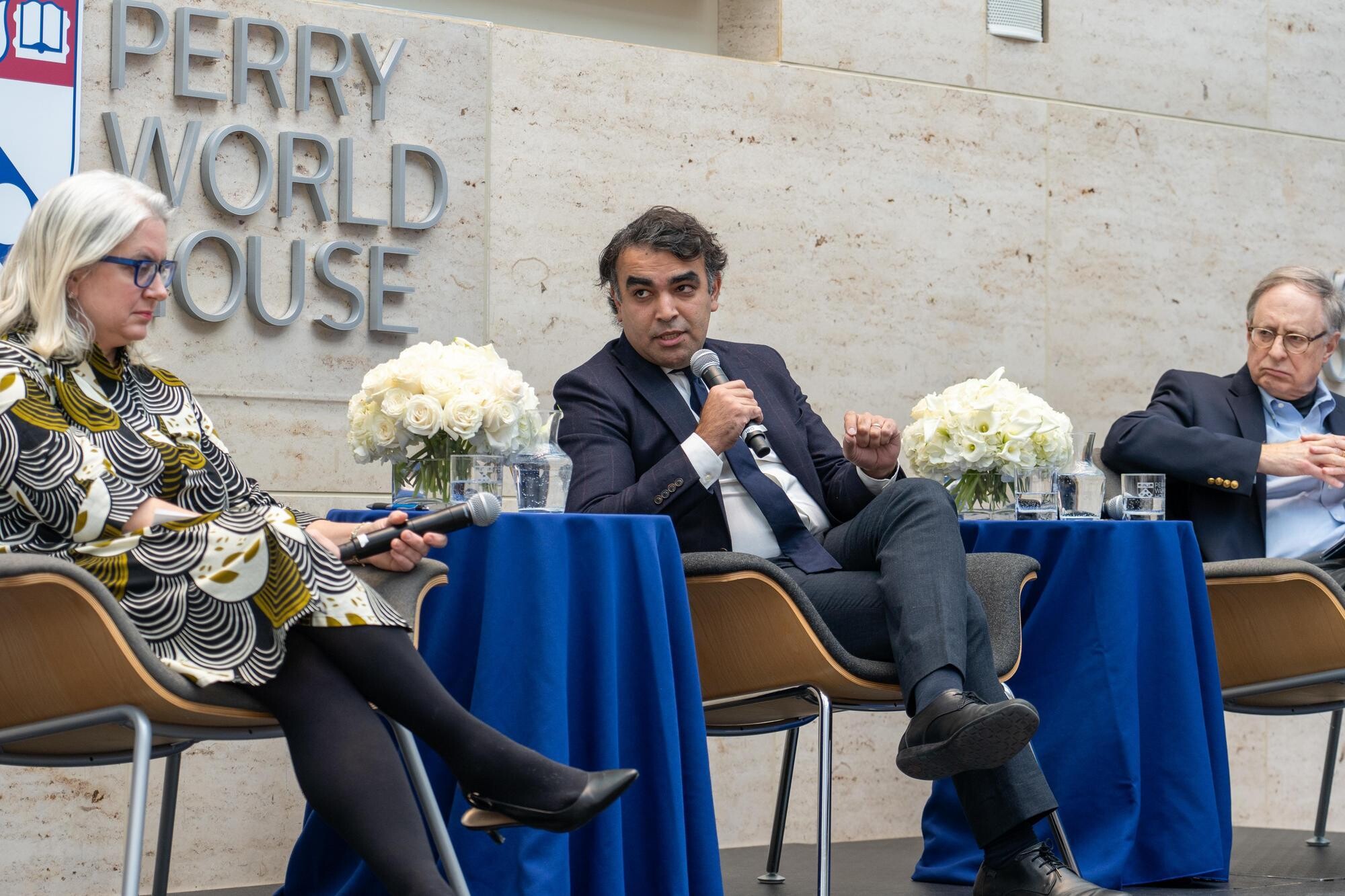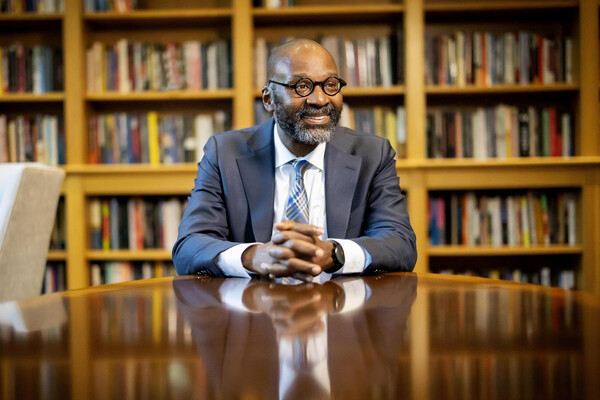
Griffin Pitt, right, works with two other student researchers to test the conductivity, total dissolved solids, salinity, and temperature of water below a sand dam in Kenya.
(Image: Courtesy of Griffin Pitt)

While there are always points of uncertainty for foreign policy during any presidential transition, the signals being sent by the incoming Trump administration’s foreign policy team are more reassuring than in the first term, members of a Perry World House expert panel said during a public forum this week.
The panel, titled “Foreign Policy Priorities for the Incoming U.S. Administration,” covered a range of topics around the globe, including conflict, international instability, artificial intelligence, and climate change. It was moderated by Justin Vogt, executive editor of Foreign Affairs magazine.
One topmost challenge is with the war between Russia and Ukraine, where the incoming president has promised a quick resolution, said Alexander “Sandy” Vershbow, a World House non-resident senior advisor, former deputy secretary general of NATO, and a distinguished fellow at the Atlantic Council.
There may be a “bellwether of foreign policy in the new administration,” he said. “This is probably the issue that’s going to get the most immediate attention under the administration, and it deserves high priority attention.”
It’s more likely than not, Vershbow said, that Trump will lean to the anti-Ukrainian sentiment in the Republican Party and force an early cease-fire on the current battle lines, which would leave Russian troops able to reconstitute their forces while in control of Ukrainian territory. Still, he said, some members of the new administration are more pro-Ukrainian than others, including National Security Advisor-designate Mike Waltz, who may be able to bend the president’s ear.
Turning to the Middle East, Vogt prompted discussion by quoting Richard Haass, president emeritus of the Council on Foreign Relations, in a recent article: “It is hard to think of a country that has lost so much influence in as short a time as has Iran.”
Hussein Banai, a visiting fellow with Perry World House and associate professor of international studies at Indiana University, agreed with that assessment. “Iranian weakness is not only a matter of it losing client states and proxies in the region but also having been exposed to the world as a country whose internal decision-making and strategic considerations are very well known to Israel intelligence and American intelligence,” Banai said. “We see them very confused, very paranoid.”
Turning to climate change, Vogt said that, while Trump has called climate change a hoax, the recent fires in Los Angeles provide a stark reality check. “How much worse can this get?” he said.
Erin Sikorsky, director of the Center for Climate and Security and a former World House visiting fellow, said Americans won’t be surprised by what they see from the Trump administration on the topic. “They’re going to step back from talking about climate change as a national security threat,” she said. “And I think that’s a real risk for the U.S. because it gives us a blind spot.”
Sikorsky said, “Even if this administration chooses not to prioritize climate change, climate is going to come for them.” She said, for example, that troops are being deployed in Los Angeles to join the firefighting efforts, and Poland put the largest number of troops ever in the field to deal with floods, and noted that Biden administration officials had to cancel foreign trips to Ukraine, Europe, and Angola due to climate-related crises.
One positive development is that while emissions have gone down under the Biden administration, they are also not increasing at the same rate they once were. “That actually matters a lot because every fraction of a degree of warming matters for what we see from disasters, what we see from wildfires, hurricanes, things like that,” said Sikorsky. “So, bending that curve is really important.”
An area in which the Trump administration will be in a position to make “enormously consequential decisions” will be artificial intelligence, said Sasha Baker, a visiting World House fellow and former acting undersecretary of defense for policy who is currently working on national security policy for OpenAI. Reaching what’s known as artificial general intelligence, where AI matches human cognition, will likely take place in the next four years, she said.
“This administration is bringing in a lot of people who get that and who have a deep background in technology and funding in AI specifically,” Baker said. “This is something that’s coming at us in the here and now,” she said. “The technology is moving so rapidly,” with major milestones happening in months rather than years. Still, Baker said, “I think it is very possible that we could win the race to develop the most advanced and most sophisticated AI technologies and fail to implement them as fast as other countries around the world.”
Michael C. Horowitz, Perry World House faculty director, who introduced the expert panel, said the event was inspired by a collection of papers produced by PWH scholars and visiting fellows with policy recommendations for the new administration being assembled by the World House’s scholars and visitors.
“There’s a lot of interest, obviously, in the world, on campus, and in Philadelphia, about what the second Trump term is going to look like from a national security and foreign policy perspective,” Horowitz said. “Perry World House, as the university’s hub for global policy engagement, is uniquely positioned to provide insight and guidance given that our work is at the nexus of academia and public policy.”

Griffin Pitt, right, works with two other student researchers to test the conductivity, total dissolved solids, salinity, and temperature of water below a sand dam in Kenya.
(Image: Courtesy of Griffin Pitt)

Image: Andriy Onufriyenko via Getty Images

nocred

Provost John L. Jackson Jr.
nocred